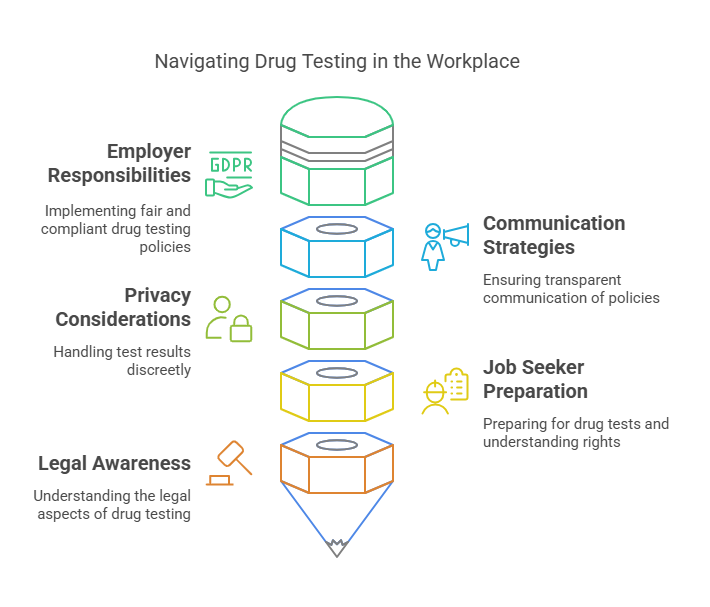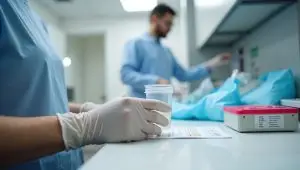Navigating the landscape of pre-employment drug screening can be daunting, especially when you're unsure whether alcohol is on the checklist. With different industries and organizations applying various rules, it's crucial to understand what these screens entail, particularly if you're involved in staffing, healthcare, transportation, or other sectors needing rigorous background checks. Many people wonder, do pre-employment drug screens test for alcohol and this article aims to provide clarity on this important question.
In this article, we'll delve into whether pre-employment drug screens test for alcohol, clarify potential outcomes, and explore related topics like CBD's effect on drug tests and the implications of THC lotion use. The goal is to equip employers, HR professionals, and job seekers with the knowledge necessary to manage and prepare for these screenings confidently.
Key Takeaways
- Pre-employment drug screens primarily focus on detecting illegal substances or misuse of prescription medications, with alcohol testing included mainly for safety-sensitive roles.
- Standard drug testing panels usually do not test for alcohol due to its quick metabolism and the legal complexities associated with its consumption.
- Alcohol testing is more common in industries regulated for safety, such as transportation, where compliance with guidelines like those from the DOT is essential.
- Employers should communicate drug testing policies, ensuring they align with industry standards and respect employee privacy.
- Job seekers should understand their rights, the specifics of drug testing in their industry, and prepare accordingly to navigate these screenings effectively.
Introduction
Pre-employment drug screens are standard practices across various industries, serving as a checkpoint to ensure a safe and productive work environment. These tests aim to detect the presence of illegal substances or the misuse of prescription medications in potential employees. They’re particularly common in sectors like healthcare, transportation, and manufacturing, where the safety and reliability of personnel are paramount.
A poignant question arises: do these screens test for alcohol? While drug tests are commonplace, the inclusion of alcohol in these screenings isn’t as straightforward. Unlike illegal drugs, alcohol is legal and widely consumed; thus, its detection involves distinct considerations based on the job type and associated responsibilities.
This article will shed light on whether alcohol is included in pre-employment drug screens and examine related matters. It's designed to equip employers and job seekers with the necessary insights to navigate these screenings effectively, understanding when alcohol might be a focal point of concern.

Do Pre-Employment Drug Screens Test for Alcohol?
In the realm of pre-employment drug testing, what’s actually on the menu for analysis can be a bit of a mixed bag. Standard drug panels typically zero in on illegal drugs or controlled substances—think of the usual suspects like marijuana, cocaine, opioids, amphetamines, and sometimes benzodiazepines. But what about alcohol? Here, the waters get murky, largely swimming with industry-specific rules and regulations.
EXPERT INSIGHT: The complexities of pre-employment drug screenings require us, as HR professionals, to have a clear understanding of what’s being tested and why. Including alcohol in the standard drug testing panels is essential for us to communicate to the job seekers who will undergo the testing. Certain industries require this, so policy owners should clearly explain the details to both employers and employees or job seekers. Overall, the goal is to build a workplace rooted in trust and honesty, and it starts with the small things that impact the big things. - Charm Paz, CHRP
Standard Drug Testing Panels
A "standard" drug test usually focuses on a 5-panel or 10-panel lineup, which mostly targets illicit drugs. Alcohol doesn't always cut primarily because it metabolizes quickly and testing for it might not yield relevant insights into a person’s long-term habits. It’s kind of like checking if someone ate a donut last Saturday; interesting, maybe, but not particularly useful.
Alcohol Testing
When does alcohol tiptoe onto the stage? This largely hinges on the nature of the job. For roles deemed safety-sensitive—where employees operate machinery, drive, or handle sensitive materials—alcohol testing could be non-negotiable. In these regulated environments, particularly under the Department of Transportation (DOT) guidelines, alcohol testing is grouped with drug testing to ensure that sobriety is upheld. Here, employers have the green light to test before employment and randomly during it too.
Non-CDL vs. CDL Testing
Non-commercial driver’s license (non-CDL) positions usually have more relaxed rules concerning alcohol unless the role directly impacts safety. Meanwhile, holders of a commercial driver’s license (CDL) fall under stricter scrutiny—a direct nod to public safety concerns. For them, both drug and alcohol screenings are standard operating procedures, per DOT mandates. Whether it's a pre-employment screening or one spurred by reasonable suspicion, alcohol isn’t side-stepped in these jobs.
In essence, while alcohol isn’t universally tested in pre-employment screens, specific industries and roles ensure it plays a starring role when the situation demands it. Knowing the nuances helps both employers hit compliance marks and job seekers sidestep any surprises.
Related Drug Testing Queries
Understanding the nuances of drug testing can save both employers and job seekers from unnecessary headaches. Here, we'll tackle some common questions related to drug testing, covering failure, costs, timelines, and the influence of specific substances like CBD and THC.
Failure, Costs, and Timeframes
Failing a drug test can have serious repercussions depending on the employer's policies and the job sector. Generally, if you fail a pre-employment drug test, you might not get the job offer. Some companies may allow retesting after a set period, while others might offer support programs or guidelines to help you comply in the future. In safety-sensitive roles, a failed test could lead to mandatory reporting and repercussions concerning professional licenses or certifications.
As for the costs associated with drug testing, these can vary widely. A standard urine drug test typically costs employers anywhere from $30 to $70. Factors affecting this include the complexity of the panel, the volume of tests purchased, and any additional administrative processing fees. Understanding these costs is crucial for companies aiming to implement fair testing policies without breaking the bank.
Mouth swab tests, favored for their non-invasive approach, come with their timelines. Generally, substances can be detected in saliva from a few hours after use up to 48 hours later. The detection window can vary depending on the substance and frequency of use, making it essential for job seekers to research and prepare accordingly.
Substance-Specific Considerations
The rise of alternative wellness supplements like CBD and CBG has raised questions regarding drug tests. Typically, CBD should not trigger a positive drug test since most tests screen for THC, the psychoactive compound in cannabis. Nevertheless, it's crucial to ensure your CBD product is pure and from a reputable source, as contaminated products could contain trace amounts of THC. This consideration is particularly relevant in places like Australia, where drug testing policies might differ.
When it comes to CBG, current drug testing scenarios generally do not specifically screen for this cannabinoid. However, as testing technology evolves, it's wise to stay informed about potential changes.
Finally, using THC lotion is unlikely to cause a positive result on a drug test. These products interact with cannabinoid receptors in the skin and generally do not enter the bloodstream in significant amounts. However, as with other products, using those with minimal THC levels remains a prudent choice, especially if regular drug testing is a part of your professional life.
Failure, Costs, and Timeframes
What Happens if You Fail a Drug Test?: Failing a drug test can set off a series of consequences that vary depending on your workplace's policy and local laws. Some employers might give a candidate a second chance, perhaps offering a re-test after a set period or requiring participation in a rehabilitation program. However, in more stringent industries like healthcare or transportation, a failed test often means immediate disqualification from the hiring process. Legal implications could arise if the test results suggest that workplace safety might be compromised.
Urine Drug Test Cost: The cost of a urine drug test can range from $30 to $60 per individual test, but prices fluctuate based on several factors. The complexity of the panel, the lab conducting the analysis, and the number of employees being tested can all influence the final price tag. Bulk testing tends to offer discounts, a detail employers might consider when planning large-scale screenings. Additionally, rapid-result tests typically come at a premium due to their expedited processing times.
How Long Does It Take to Pass a Mouth Swab Test?: Mouth swab tests are popular due to their non-invasive nature and ease of administration. Detection windows for substances like THC and cocaine range from a few hours to three days. This makes them particularly useful for identifying recent drug use. Given this brief detection window, job seekers should focus on refraining from substance use days before the test, rather than relying on detox methods, which are often unreliable.
Substance-Specific Considerations
When it comes to drug testing, particular substances often come under scrutiny due to their prevalence and evolving legal status. Here, we break down some of these considerations to help both employers and job seekers navigate the terrain with confidence.
Drug Mouth Swab Tests
Mouth swab tests, or oral fluid tests, are becoming popular due to their non-invasive nature and ease of administration. These tests typically screen for substances like THC, cocaine, opiates, methamphetamine, and MDMA. The detection window is relatively short, often catching drug use within the last 24 to 48 hours. This makes them particularly useful for assessing recent consumption rather than habitual use.
CBD and CBG Considerations
With the rising popularity of CBD products, many people wonder whether they'll show up on drug tests. Generally, CBD is not something these tests screen for. However, there's a caveat: some CBD products may contain trace amounts of THC, which could result in a positive test. In Australia, where regulations may vary, the THC threshold levels are the key concern, not the CBD itself. As for CBG, it's lesser known and less likely to be tested, but it's always wise to consider the specific formulation of the product you're using.
Will THC Lotion Show Up on a Drug Screen?
Topical THC products are a bit of a grey area. While they're designed to provide localized relief without the psychoactive effects associated with THC, it's natural to wonder if they could trigger a positive test. Generally, THC lotions don't result in systemic absorption of THC at levels that would become detectable in standard drug tests. The science indicates that unless there's a systemic absorption (e.g., through ingestion or inhalation), topical applications are unlikely to show up. However, caution and awareness of specific product usage remain advisable, as formulations and individual responses can vary.
Understanding these considerations about specific substances can demystify drug testing processes, allowing individuals to make informed choices and employers to set fair testing policies.
Broader Background Screening Aspects
What is a Health Screening for a Job?
Health screenings in the workplace are a basic measure to ensure that employees are physically capable of performing their job duties. These often include assessments like vision tests, hearing evaluations, and sometimes more specific medical examinations tailored to the role. In industries like healthcare or jobs with physical demands, these tests ensure that the staff can handle job-related stress and responsibilities without risk to themselves or others.
Non-CDL Driver Requirements
For non-commercial drivers, drug testing norms lack the rigidity enforced upon CDL holders, yet safety remains a priority. While non-CDL positions may not universally require drug tests, companies still adhere to policies that safeguard their operations. Depending on the company's discretion, drug screening can play a critical role, especially in roles entailing substantial travel or machinery operation. Understanding both company-specific policies and state regulations is essential for compliance and safety.
Employee Rights and Employer Obligations
Navigating employee rights and employer obligations in background screening is a balancing act. Employers must conduct due diligence while respecting privacy laws and anti-discrimination guidelines. The U.S. Equal Employment Opportunity Commission (EEOC) and the Federal Trade Commission (FTC) provide robust guidelines. While employers are tasked with creating a safe workplace, they must exercise transparency and fairness. Employees, on the other hand, should be aware of their rights to access information and contest inaccuracies, empowering them to engage confidently in the employment process.
Tips for Employers and Job Seekers
For Employers
Implementing fair and compliant drug screening policies is an essential part of managing a successful workforce. Start by clearly defining the purpose and scope of your drug testing policy. What are you aiming to achieve, and how does it relate to job performance and safety? Ensure your policies are in line with industry standards and legal requirements, particularly regarding alcohol testing in roles with safety-sensitive duties.
Once your policy is in place, communicate it transparently. Employees should understand what substances they're being tested for, the frequency and method of testing, and the repercussions of failing a test. Regular training sessions for managerial staff can ensure consistency in policy application and compliance.
Finally, consider privacy and confidentiality. Drug test results should be handled discreetly, respecting the privacy of your employees while safeguarding your organization’s interests.
For Job Seekers
Preparing for a drug test may seem daunting, but a little preparation can go a long way. First, familiarize yourself with the substances typically screened in your industry and understand the specifics of the test you'll be taking, whether it's a urine, saliva, or hair test.
Practicing good lifestyle habits is crucial. Adequate hydration, a balanced diet, and regular exercise can help maintain your overall health. If you're using prescribed medication or legitimate substances that could affect your results, gather documentation or a doctor’s note to explain your situation to potential employers.
It's also vital to know your rights. Research the legal parameters around drug testing in your area and understand your options should you be asked to undergo a test. Being informed about what to expect and how to respond can make the process less stressful.

Conclusion
In wrapping up, we circle back to the core question: Do pre-employment drug screens test for alcohol? Generally, alcohol is not a part of standard drug testing panels unless the job involves safety-sensitive duties or specific regulatory requirements, such as those for commercial drivers (CDLs). Employers in transportation or safety-critical sectors are more likely to include alcohol in their screenings.
For both employers and job seekers, staying informed is key. Understanding what to expect can mitigate anxiety and contribute to smoother hiring processes. Employers should craft clear, compliant drug testing policies, while job seekers should familiarize themselves with their rights and prepare accordingly.
For further exploration into employment background checks and additional guidance, consider visiting comprehensive resources like GCheck’s blog and their FAQ section. Empowerment lies in knowledge—approach drug testing with the confidence of being well-informed.
Frequently Asked Questions (FAQs)
Deep-diving into the nitty-gritty of pre-employment drug screens which cover alcohol may raise questions so here's a list of FAQs. It is important to address them early on to avoid any confusion. The key is understanding it for you to be prepared.
How long does alcohol stay in your system for a urine test?
Alcohol can be detected in urine for up to 12 to 48 hours after consumption. However, this detection window may be extended up to 80 hours if the test includes ethyl glucuronide (EtG) screenings.
What types of jobs are most likely to require alcohol testing?
Jobs that involve safety-sensitive positions, such as those in transportation, aviation, construction, and certain healthcare roles, are more likely to require alcohol testing to ensure employee and public safety.
Can prescription medications affect a drug test for alcohol?
Most prescription medications do not affect alcohol tests specifically, but some medications contain alcohol as an ingredient or can cause false positives for other substances. It's important to disclose any prescriptions to the testing administrator before the test.
What should you do if you test positive for alcohol in a drug test?
If you test positive for alcohol in a drug test, it's essential to be honest with your employer or the testing authority. You may request a re-test or provide evidence of any legitimate reasons for the result, such as recent consumption of alcohol-containing medications or foods.
Do pre-employment drug screens test for alcohol?
In most standard drug tests, alcohol is not included unless the job involves safety-sensitive responsibilities or specific regulatory requirements, such as those for commercial drivers (CDLs). Employers in transportation or safety-critical sectors are more likely to include alcohol in their screenings.

GCheck Editorial Team
Meet the GCheck Editorial Team, your trusted source for insightful and up-to-date information in the world of employment background checks. Committed to delivering the latest trends, best practices, and industry insights, our team is dedicated to keeping you informed.
With a passion for ensuring accuracy, compliance, and efficiency in background screening, we are your go-to experts in the field. Stay tuned for our comprehensive articles, guides, and analysis, designed to empower businesses and individuals with the knowledge they need to make informed decisions.
At GCheck, we're here to guide you through the complexities of background checks, every step of the way.





